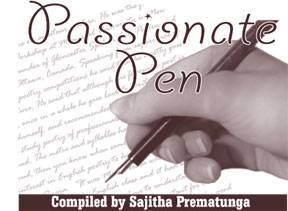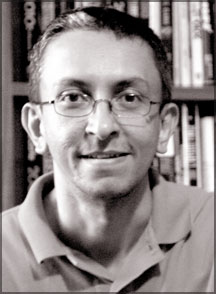Let the experiment begin
By Sajitha PREMATUNGE
 My
mind invariably ran back to the half a dozen times I read Sir Arthur C.
Clarke, and any hope of ever writing and publishing a science fiction,
was cruelly crumpled. In fact considering the meagre enthusiasm
displayed by amateur writers, generally in dabbling with science
fiction, as compared to other literary genres, it's difficult to believe
that science fiction could take a sudden turn for the better in the near
future. With the World Science Day just around the corner Passionate Pen
decided to get to the bottom of why Sri Lankan science fiction is
lagging behind. My
mind invariably ran back to the half a dozen times I read Sir Arthur C.
Clarke, and any hope of ever writing and publishing a science fiction,
was cruelly crumpled. In fact considering the meagre enthusiasm
displayed by amateur writers, generally in dabbling with science
fiction, as compared to other literary genres, it's difficult to believe
that science fiction could take a sudden turn for the better in the near
future. With the World Science Day just around the corner Passionate Pen
decided to get to the bottom of why Sri Lankan science fiction is
lagging behind.
"You don't have to be a rocket scientist to write science fiction.
All it takes is a healthy interest in science and a vivid imagination."
says Nalaka Gunawardene. He can be best introduced as a science and
development writer, having written well over 2000 articles. He
identifies himself, basically as a storyteller and science writer by
training.Speaking with a 21 year experience of working as a research
assistant for Sir Arthur C. Clarke, he says that defining science
fiction in itself is difficult and controversial. There are two types of
science fiction, fantasy - the likes of Star Wars and Star Trek - and
hard core science fiction, such as 2001: A Space Odyssey. Hard core
science fiction are based on the limits of science, Laws of physics,
they are basically things that are likely to happen. "But the
demarcation between science fact and fantasy is vague." Science
fantasies of the 19th century like space travel have now become science
fact. "Science fiction is something that is likely to happen, but would
want not to happen. Fantasy is something that's unlikely to happen, but
you wish it would." he explained. However he said that science fantasy
is nothing inferior. "They are just two types of the same genre. However
the average reader is more attracted to fantasy."
Science fiction writers have additional intrinsic obstacles. They
have to describe everything in detail. "When Sir Arthur Conan Doyle
describes a foggy night everybody understands it. But science fiction
writers are faced with the difficult task of having to describe
extraterrestrials and alien worlds." In spite of the fact that the mode
of presentation of science fiction ranges from movies to video games and
the internet has opened up whole new opportunities, there are other
major difficulties that writing science fiction entail.
|

Nalaka Gunawardene |
"There are differences in perception." Nalaka Gunawardene explained
that many critics dismiss it as not even fit to be considered as
fiction. The major reason for this may be the initial bad impression
given by pulp fiction - through which authors like Isaac Asimov and Sir
Arthur C. Clarke made their debut when other publishers simply refused
to even entertain them - between 1930s and 50s. "In 108 years of its
history the Nobel Prize was never awarded to a science fiction." He
explains that, although science fiction have become science fact and
writers like Isaac Asimov have become household names just as other
mainstream writers, this perception still lingers.
The situation is no different in Sri Lanka. Little recognition is
given to science fiction in Sri Lanka today, as apposed to main stream
fiction. "Once in a while a writer like Harsha Wasalathanthri would win
the State Literary Award, but apart from this science fiction writers
are given little encouragement." He points out that even detective
stories have not received much recognition. But with the mainstream
writers also starting to dabble with science fiction - Carl Muller
(Exodus) - Nalaka Gunawardene believes that the future of science
fiction would be more promising. Another factor that hinders the due
recognition of science fiction writers is fact that most vernacular
science fiction writers go unnoticed, or at least they are not
recognized for their science fiction. "Great writers like Jules Verne
and Sathyajith Ray have written in vernacular languages. In fact Amitav
Gosh's Calcutta Chromosome is a great historical science fiction set in
19th century British India." But he pointed out that Gosh is better
known for her mainstream novels, while science fiction writers who write
in their respective vernacular languages would never make it into the
international market.
In the Sri Lankan context science fiction in Sinhala/Tamil stand a
better chance of selling at least among the Sinhala/Tamil readership.
However by opting to write in a vernacular language in the first place,
the writer loses out on the international readership.
However Nalaka Gunawardene points out that there are few original
Sinhala science fictions. He implied that most Sri Lankan science
fictions are trapped in an innate cultural egotism. According to him
most Sri Lankan science fictions are based on the same storyline, where
technology wreaks havoc and a single man saves the world from an
apocalypse. "Science fiction should always be, first and foremost
entertaining. In stead they are using science as a trapping to get
across their pet theories. If we leave our ideological baggages aside
and aspire to be entertainers, the readers will follow."
We have miserably failed to exploit English science fiction as a
means of reaching the international readership. "In the global setting
this is not so. Science fictions like Frankenstein have existed, they
are just not considered as science fictions any more. They have become
iconic." He also pointed out that there are few writers competent and
confident enough to write in English in Sri Lanka. A short term solution
for this would be to encourage translations. Translations of science
fiction in Sri Lanka, are mostly from English into Sinhala. One of the
greatest challenges would be to translate vernacular science fictions
into English so they have a better change of exposure in the
international setting.
One reason for this lack of confidence is the misconception that you
have to be a rocket scientist to write science fiction. Gunawardene
explained that some of the highly accomplished science fiction writers
have not come from science based background. "It's not only scientists
and the engineers who are capable of dabbling with this genre."
He feels that the artificial demarcation of students, between the
sciences and arts, is one reason for this hesitation. He explained that
this demarcation leaves no room for cross fertilization. "After this
demarcation students are stuck to their respective streams. You rarely
encounter a doctor who can sing or paint" and explained that even the
reading preferences of arts students are less grounded in science.
Although science students possess the necessary knowledge, they lack
writing skills. And although arts students possess the skill, they lack
the know-how. This dichotomy has prevented people from dabbling with
science fiction. "There are not enough bridges between the arts and
sciences in Sri Lanka. All of this tend to put off amateur science
fiction writers." According to him nurturing amateur science fiction
writers to become professionals have hardly begun in Sri Lanka.
"Everybody play sports. Science fiction can be regarded in pretty
much the same terms. Everybody talks about cricket, writes about cricket
and plays it. Why can't we use science fiction as a way of life, like
cricket."His advice for potential science fiction writers is "Start
experimenting. It's like swimming, you can't learn swimming terra
firma." He explained that amateurs should overcome initial fears. Even
if you are not confident enough to publish, share your work among peers.
"As Sir Arthur C. Clarke once said 'No work of art is finished, it's
just abandoned" He explained that this abandonment should be the minimum
level of perfection for that work to be able to stand on its own. "But
the problem is that some of our writers abandon their work too soon.
It's pretty much like cutting a gem. And there are no short cuts."n
|

